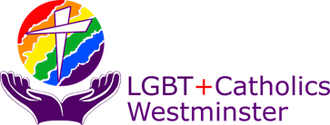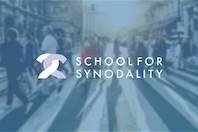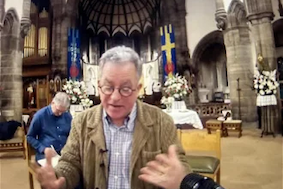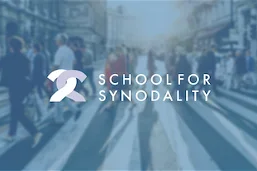Westminster: LGBT+ Catholics Synodal Pathway Synthesis

LGBT+ Catholics Westminster submitted the following response to the Synodal Pathway survey:
Date of Submission 21/01/2022
How many people took part in your synodal process ? = 37
How do you think the participant(s) in your synodal pathway would describe themselves - tick all that apply:
x Committed to Faith, Regular attendance at Mass and participates in community life e.g. Member of pastoral council/ attends prayer group/reader/volunteer
x Committed to Faith, Regular attendance at Mass
x Faith & Church have some relevance. E.g. Occasional Attendance at Mass
Culturally Catholic but Church has little relevance
From a different Christian tradition
From a different faith community
Person of no faith
1) What was the story of your synodal pathway in your parish/community?
- What were the main steps you took?
- What was done to engage as participants and to reach out to the peripheries?
- Approximately what proportion of people in your active parish/Church community participated in one way or other?
- Were there any groups of people whose participation was especially noteworthy?
- Were there specific groups of people who did not participate for any reason?
The LGBT+ Catholics Westminster Pastoral Council is recognized as a Chaplaincy in the Diocese of Westminster: http://rcdow.org.uk/diocese/lgbt-chaplaincy/ It is mandated by Cardinal Vincent to develop pastoral support, based at Farm Street Jesuit Church, for LGBT+ Catholics, parents and families. It also has an active LGBT+ Younger Adults Group. Our contributions in this Synthesis Form refer to both Diocesan, Parish, and wider Church contexts.
In recent months reflections on Synodal themes have been included in our monthly News & Notes. Our e-mail circulation includes many LGBT+ Catholics and parents in other countries and some of these participated in our Synodal pathway.
We held 2 live, face-to-face Listening Sessions (12 people at each) at Farm Street Jesuit Church and 1 on-line Zoom session (16 people, including one person from Poland). We adapted the questions from the Diocesan Resources, since these were found to be too prescriptive, and not responding to the reality of people's experiences. A number of people have taken part in Root & Branch Synod activities and also webinars organized by the US-based New Ways Ministry. We are also engaged in Synodal themed activities through membership of the European Forum of LGBT+ Christian Groups and the Global Network of Rainbow Catholics.
Our usual attendance at twice-a-month Farm Street Masses of the more active members is 40-50. Our total circulation list numbers approximately 900 contacts, with some of these dispersed around the UK & Ireland, as well as overseas. Therefore, the number actively involved in the Westminster Synodal pathway is a minority.
LGBT+ Catholics Westminster is a very diverse community and the Listening Sessions included lesbian, gay and trans people from British, Croatian, French, Irish, Italian, Latin American, North American, Polish, Portughese, South African and Spanish backgrounds. There was good gender balance and a number of younger people took part.
We lacked participation from those in our community who are refugees/asylum-seekers.
2) What experiences of 'journeying together' were shared?
- What experiences of 'journeying' during the pandemic were shared? What insights did this reveal?
- What experiences were shared more generally of the Church 'journeying together'? What had brought joy? What had caused pain or sadness?
- Who did people feel were missing from the Church community? Did participants share anything about the Church's experience of journeying with and including others beyond the visible Church community?
- Was anything shared about how the parish/community works together or how co-responsibility is put into practice?
While there was frequent reference during pandemic lock-downs about returning to 'a new normal', LGBT+ Catholics are concerned that 'the old normal' was a place where they were at best 'tolerated', silenced, neglected, or confined to invisibility, and at worst
rejected by the institutional Church and much of its hierarchy. 'A new normal' must reject these symptoms of homophobic and transphobic structural sin and promote affirmation of LGBT+ people and their relationships. The public face of the Church seemed remote when the issues that the pandemic raised brought up clearly spiritual/religious dimensions.
Given different patterns of response to pandemic lockdowns, whether at different parish or Diocesan levels, 'journeying together' was unpredictable. For many, returning to their local parish community and worship was found to be a negative experience as opposed to their sense of acceptance, inclusion, and welcome at Farm Street. Livestream and Zoom events, including Masses were seen as better than nothing. When able to gather face-to-face, we were reminded of how we gain from other people's bodily presence and the interactions of communal experiences. The idea of 'journeying together' gave an impulse for reflection, developing personal spirituality, an appreciation of community, and longing for a physically tangible church community. Negatively, and therefore causing sadness, was a sense that some, clergy and laity, continued to act as gatekeepers, deciding who was and who wasn't part of the Church.
Over the past 2 years LGBT+ Catholics Westminster has continued to welcome new people to both virtual and actual Masses at Farm Street, including some requesting Baptism, Confirmation, or Reception into Full Communion with the Church, others seeking blessings for their relationships.
The LGBT+ Catholics Westminster Pastoral Council has continued to meet as it attempts to respond to the specific needs of LGBT+ communities and communicate these to Farm Street Parish and Westminster Diocese. We value the observer-presence of Farm Street's Parish Priest and its Parish Council Chair at our meetings and also the presence of our Chair at the Farm Street Parish Council. We also value the presence of members of the Jesuit community at after-Mass social gatherings. We were pleased to be able to welcome people living with HIV/AIDS to the annual Mass for World AIDS Day and Westminster Diocese's Vicar-General who presided. These experiences affirm our sense of communion with the local parish and wider Diocese.
3) What experiences were shared about the Church's priorities for mission?
- What did people wish to celebrate about how your parish/community lives its mission?
- How did people feel included in the way the parish/community decides priorities for mission?
- What areas of mission did people say were being neglected within the Church?
- In what ways did they see partnerships with people beyond the Church developing?
LGBT+ Catholics Westminster sees itself as above all else a Eucharistic community, the Body of Christ, the inclusive people of God, proclaiming that all are welcome in this place.
We have appreciated being embedded in Westminster's Diocesan and Parish communities over the past 14 years, and also the presence of Cardinal Vincent at 2 Masses and other LGBT+ Catholics gatherings, but the parish and Diocese need to affirm more clearly LGBT+ Catholics' visibility. We constitute a significant percentage of the congregation at 2nd & 4th Sunday evening Masses. While a welcome is given and our presence is acknowledged at the start of Mass, and an invitation to after- Mass refreshments is offered at the end, there is rarely any reference to the spiritual and pastoral needs of LGBT+ Catholics, parents and families, during the homily; it is as if we are rendered invisible.
The LGBT+ Catholics Westminster Pastoral Council has in its Terms of Reference, affirmed by the Diocese, the requirement to identify pastoral and mission priorities. We also seek to do this in the wider context of Farm Street Parish. A number of people from LGBT+ Catholics Westminster are involved in the work of St. Vincent de Paul Society, volunteering at lunches for the street-homeless. Qualified members of our community offer counselling, spiritual accompaniment, personal pastoral support, and faith-nurturing opportunities. A question has arisen as a result of the opening of the London Jesuit Centre as to its sense of pastoral commitments and priorities within the context of the parish. Does the parish serve the Centre or vice-versa?
There is a concern that the Church's mission and sometimes the parish's mission is to predominantly white, middle-class to wealthy, heterosexual people, rather than than to the wider diversity of the Body of Christ, the people of God. LGBT+ Catholics Westminster has developed a preferential option to support refugees and asylum-seekers who seek safety due to their experience of discrimination and criminalisation in countries of origin. We offer support regardless of faith-identity.
LGBT+ Catholics Westminster holds a commitment to evangelization, beyond its own community, through participation and witness in annual Pride-in-London events.
4) What was most significant about the whole experience?
- What did you notice about how people participated? What attitudes or feelings stood out?
- What was particularly significant, surprising or unexpected?
- What topics or issues gave rise to diverse points of view?
Which stories or real-life experiences were especially moving and why? (Please anonymise - we only need a sense of the experiences shared.)
- Which experiences seemed to have strong resonance? Which experiences were mentioned less but are significant?
LGBT+ Catholics, their parents, friend and allies expressed strong concern at the Vatican's continuing, offensive, official rhetoric regarding the diversity of sexual orientation and gender identity. We call for a new theology that emerges from the pastoral realities of LGBT+ lived experience and relationships. We call for a recognition that LGBT+ people are a gift to the Church and not a problemitised community who have to pass certain criteria in order to gain acceptance and recognition.
Given that 'Catholic' means 'universal' or 'inclusive', we call upon the Church's hierarchy to abandon the language of 'intrinsic moral evil' or 'objective disorder' and for these to be deleted from the Catechism of the Catholic Church. We call for a global and focussed Listening Process on Human Sexuality and Gender Identity, to include LGBT+ Catholics, their parents and families, pastoral workers, human sciences experts, theologians and bishops.
5) Overall, what were the fruits that the Holy Spirit has brought about through this experience?
- What dreams, desires, and aspirations for the Church were expressed by participants?
- Were there any particular issues that the people felt the Spirit was inviting the Church to pay more attention to?
- In what ways did you sense the Holy Spirit inviting your parish/community to grow in synodality?
- Based on what was shared, what steps might your parish/community feel called to take in their journeying together?
We dream of a Church where the baptismally-rooted gifts of all are truly respected, including the full and visible involvement of women and LGBT+ people in all levels of the Church's ministry and other aspects of the Church's life. God's vineyard is not a solitary shrub, but plants growing next to each other in a common soil, which intertwine and help to grow. We are part of one bread, one body.
We seek an apology from the Church's hierarchy, preferably from the Bishop of Rome on behalf of all his brother bishops, for the harm and damage done to LGBT+ people, their parents, families, children and young people. We ask church institutions to desist from supporting or promoting criminalization on grounds of sexual orientation and gender identity. Instead we ask all sections of the Church to risk listening to the reality of social consciousness and political will as they enable all people to contribute to the common good, regardless of gender, sexuality, class, ethnicity, age, or ability.
We encourage all parishes to be explicit in their welcome of LGBT+ people, in religious activities as well as social inclusion. The LGBT+ Catholic community at Farm Street should be a 'staging post' through which people can be nurtured and encouraged to engage in their local parish communities, thus contributing to the rich diversity which is a hall-mark of the Catholic Church. To start, each parish should display the poster approved by Cardinal Vincent, alerting people to the ministry developed at Farm Street Jesuit Church.
We are encouraged by and support the development of an increasing number of LGBT+ diocesan pastoral ministries in England & Wales.
We feel a need to engage more constructively with the Catholic education sector to ensure that its schools, colleges, and higher education institutions are places of welcome and inclusion for LGBT+ students and young people.
We urge the restoration of the Westminster Diocese Pastoral Council with representation from all parts of the Diocese and specific populations, including LGBT+ communities so as to take forward a Synodal strategy and process for the years ahead.
Optional: Is there anything else you'd like to share?
We ask that the Synod Prayer currently in use be discarded and an alternative prayer for guidance be found. The English translation bears little resemblance to the Latin original, nor to Italian or Spanish translations now in use. Particularly offensive for LGBT+ Catholics is the phrase not to 'promote disorder', when such a word is used by official Vatican teaching to refer to LGBT+ people. Also judgemental is the description of 'sinful', even though we are all sinners.


















